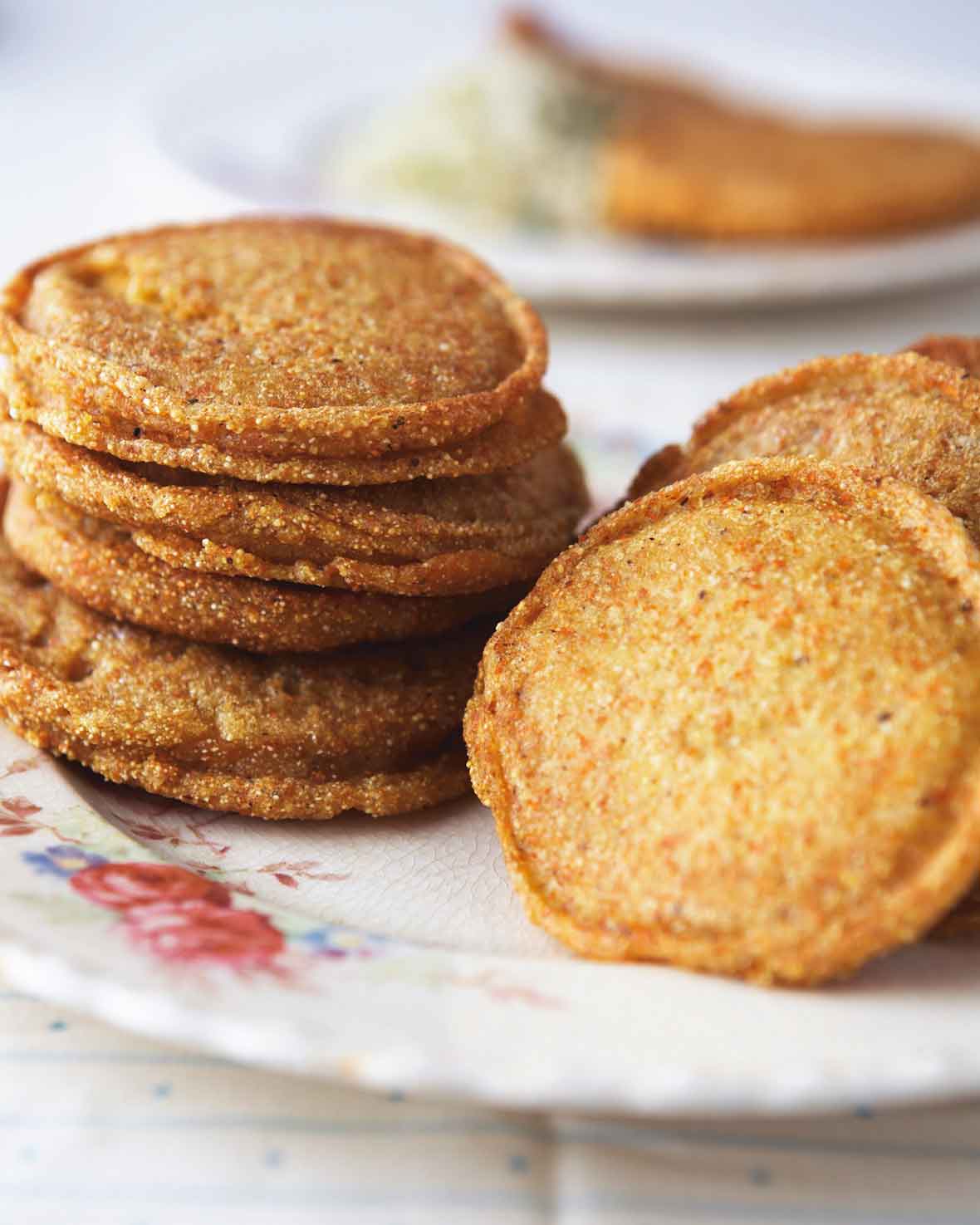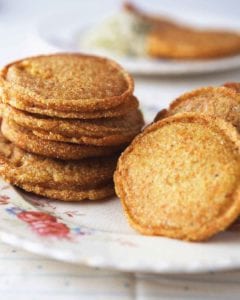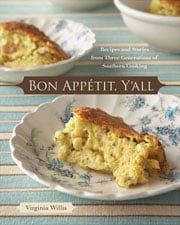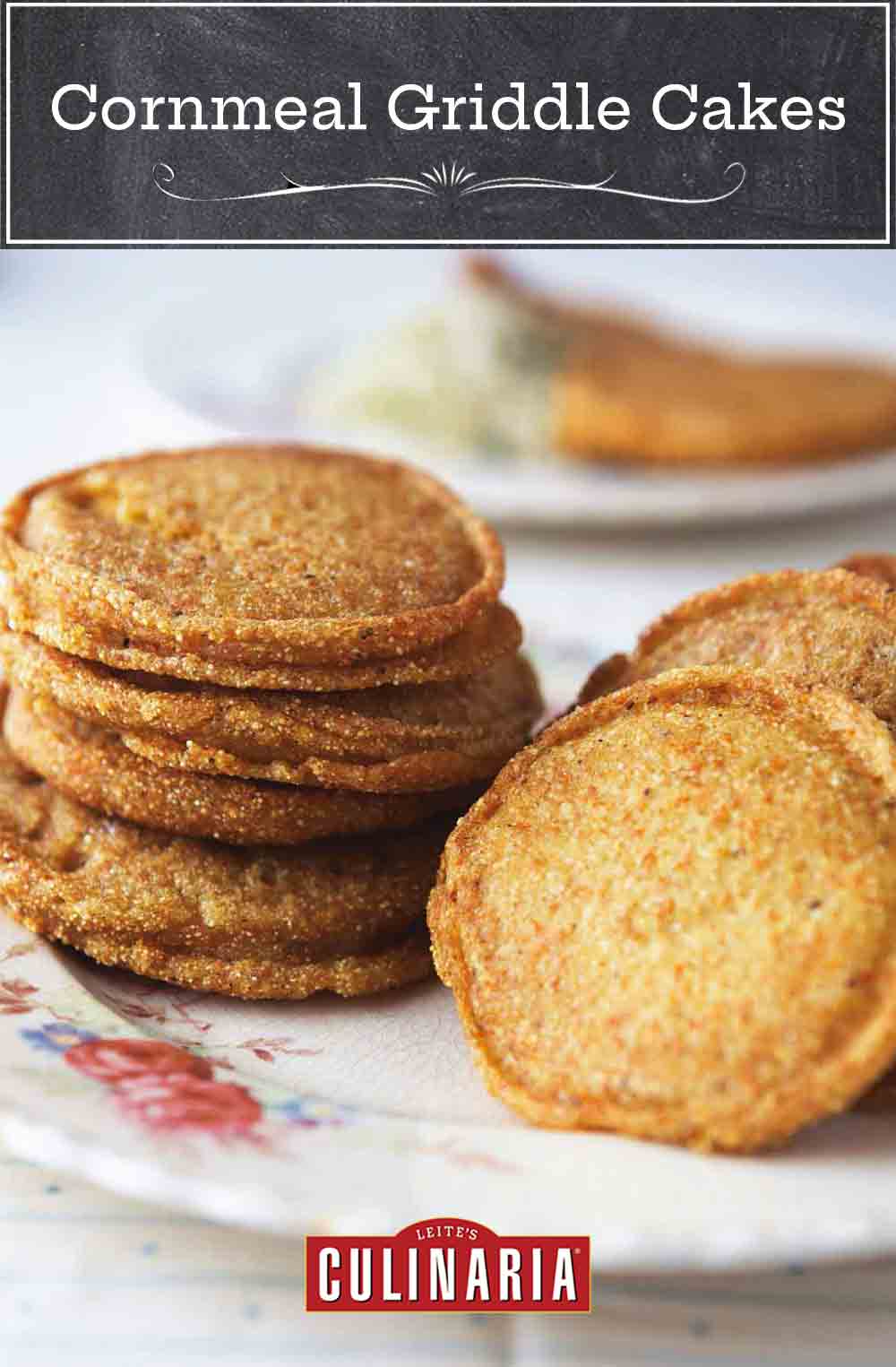
Cornbread was for many years the basic bread of the rural South, the very poor South. Corn bread is close to being religion in the South. But for years, corn bread was the primitive Baptist to the Episcopalian biscuit, the all-night tent revival to the ladies’ prayer luncheon. Cornmeal griddle cakes are the most basic of Southern breads. Biscuits require expensive dairy products, while gluten-free cornmeal griddle cakes, also known as hoe cakes, can be made with little more than meal, a bit of oil, and water. They’re especially delicious to sop up juices and gravy.–Virginia Willis
How Are Cornmeal Griddle Cakes Different Than Pancakes?
Crisped exterior. Ethereally airy interior. Pleasantly gritty through and through. Can’t blame us for swooning over these cornmeal griddle cakes! Lest you mistake them for that other sort of griddle cake, the kind you stack five high on a plate in a puddle of melted butter and maple syrup, bear in mind that these savory somethings have no leavening and no sugar. As such, they’re best as a second fiddle to anything that needs a lovely little something to sop and mop up its juices, whether roasted lemon chicken thighs, pulled pork, the burnt ends of brisket, or, well, you get the gist. They’re also quite respectable with just a bunch of butter and syrup. Darn good thing they’re quick to make, as you may find yourself in need of a second batch.

Cornmeal Griddle Cakes
Ingredients
- 2 cups white or yellow cornmeal
- 2 teaspoons baking powder
- 3/4 to 1 teaspoon fine sea salt
- 1 large egg, lightly beaten
- 1 cup water, plus more if needed
- 1/4 to 1/3 cup mild-flavored vegetable oil, for frying
Instructions
- In a large bowl, whisk together the cornmeal, baking powder, and salt.
- In a second bowl or large liquid measuring cup, whisk the egg and 1 cup water until smooth. Stir the wet ingredients into the dry ingredients, using as few strokes as possible. The batter should be soupy but not watery.
- Heat 1/4 cup of the oil in a cast-iron skillet over medium heat. Ladle 1/4 cup of batter into the heated skillet for each cake, being careful not to crowd the skillet. When the batter hits the hot oil, the edges will sizzle and become very crisp.
- Cook the cakes until the bottoms are a rich brown and bubbles form on the tops and along the edges, 2 to 3 minutes. Turn and brown the other side, an additional 2 to 3 minutes. For best results, be sure to cook the cakes until the edges are deep, rich, golden brown.
- Serve immediately, flipping those little babies onto a plate and passing them along while you fry up the remaining cakes, adding oil to the skillet as needed.

Explore More with AI
Nutrition
Nutrition information is automatically calculated, so should only be used as an approximation.
Recipe Testers’ Reviews
These cornmeal griddle cakes were easy to make. With such a short list of ingredients and simple measurements, you won’t need the recipe after you follow it a few times.
We enjoyed the cakes with maple syrup and they were delicious. But since they were neither sweet nor savory, and full of straightforward corn flavor, we thought they would make perfect “quick flat cornbread” without having to turn on the oven. I can see a couple of these rounds served on the side of a bowl of chili.
The recipe yielded 10 griddle cakes that were about 3 1/2 inches in diameter. You decide how many mouths it satisfies in your household.
These griddle cakes are simple to put together and quick to cook. They have a great crispy outside and chewy cornmeal center.
They’re good hot off the grill with butter and syrup and they’re also good for savory toppings such as a tomato salad.
Very laid-back and simple food, definitely Southern style.
I did need to add more water, as suggested; I got it to the consistency of wet sand, which seemed to work well. I used a cookie scoop to portion out the cakes in the pan and then flattened them out so they could crisp and cook thoroughly. Keep your oil at the ready. I definitely needed more than 1/4 cup, but that was a good starting point.
I made these cakes with steak, shredded basil, garden-fresh sliced tomatoes, and buttermilk ranch drizzled over top. They were delicious and a great accompaniment to any good protein.
Since I’m always looking for unique ways to use cornmeal, I found this recipe enticing. The preparation could not be easier. All of the ingredients were readily available in my pantry, so I was off and running.
While the batter came together simply, it did require about 1/2 cup more water. Since I was cooking at a high elevation, I poured the entire 1/4 cup oil into the pan to begin the frying process. After each batch, I did need to add a bit more oil (I kept the oil level at about 1/4 inch depth). Each side crisped up to a nice golden brown.
As I prepared to serve them, I realized I had never eaten a corn cake before and was in the dark on how to plate them. I had some leftover lavender honey sauce from another recipe and used that to top the corn cakes. They were delicious—crispy on the outside, light like a corn muffin on the inside.
This is not a recipe that you just make and eat by itself. If you do, it really is not that great. It’s a bit bland and slightly dry. However, used as a base for some stew, chili, or barbecue, it’s wonderful. I used it as a base for some poached eggs and homemade Canadian bacon. It really was outstanding and soaked up that yolk like a champ.
It’s very simple to make with minimal effort and ingredients. I did at first “slick” my cast iron pan, and the cakes worked out ok. However, for the second batch I used more oil—closer to 2 or 3 tablespoons—and the cakes were much better, with slightly crispy edges. The recipe made 8 cakes for me.
I would make it again and maybe add some chipotle Hollandaise to really round out the eggs Benedict motif.
I was pleasantly surprised at how much I liked the finished product of this recipe. I had never made anything like this before and didn’t know what to expect. What can I say — delicious! Loved the corn flavor and the crunch from the cornmeal. I used a coarse cornmeal, and my co-eater thought it might be better with a finer grind. Also found that the cakes made last were a little less crunchy than the first batch. This recipe made 10 cakes for me. Tried it with maple syrup, strawberry preserves, and also honey and butter. Loved them all! So quick to make, I’ll certainly make these again!
These griddle cakes are simple and delicious. They make a great stand-in for corn bread, take much less time to make, and don’t involve the oven (which is a good thing in the summer). As someone who is from the northern part of the country, my taste preference definitely tends towards sweeter corn bread and griddle cakes. I used less oil than called for in the recipe — just enough to moisten the pan — and the cakes still came out with a nice golden crust. I also added a bit more water to the batter, as the first few were dry. They were nice with savory food, but I really enjoyed them for breakfast with Greek yogurt, raspberries, and maple syrup. One recipe made about 11 to 12 griddle cakes. When I make them again, I will most likely reduce the salt a bit.
I make something similar to these quite often. These are easy and quite tasty hot from a cast-iron skillet with a smear of butter. I did need to add a bit of water to the batter to get a nice consistency. I drizzled some of the 1/4 cup oil (I used sunflower oil) into the skillet each time I fried a batch. I ended up with 8 griddle cakes.
This was a very easy recipe to make and actually faster than it says. We ended up having them with baby lamb legs, and I must say, oddly enough, that it was a great combination. The juices from the roasted lamb were perfect for the cakes.
Do not confuse cornmeal griddle cakes with buttermilk pancakes! Though these easy-to-make cornmeal griddle cakes can be served smothered in butter and syrup like a pancake, they would also be terrific aside beans, chili, tomato relish, or anything you’d eat with corn bread. They are, in fact, a quicker simpler form of corn bread. I think they’d be great with some whole kernels of corn added, or scallions, or even some kind of peppers — jalapeños, chipotles, diced or chopped Southwestern green chiles, or a little pinch of ancho powder or an even smaller pinch of cayenne. My batter was thick, and I ladled out eight quarter-cups onto my pre-heated skillet. Cooking in batches, the timing was perfect, though I didn’t see much bubbling on the tops and edges. I oiled between each batch of cakes, generously. These cry out for oil aplenty! The browning is important, both visually and for the great crisp texture it creates, just like corn bread cooked in cast iron! Definitely heed Willis’ advice to serve immediately: They are never better than the second they come out of the skillet!
This recipe is very good, but what would make it better is more salt. I added some extra to the batter after I fried a few. I didn’t use the full 3/4 cup of oil because I was not making them in a larger skillet. I have a Scanpan — love the way it browns, but my skillet isn’t too large, so I made them one at a time. It was just three of us, and they don’t take long to fry. The directions are right on for the time. I want to make this again, and I can see adding corn and onions next time.

















2 cups of cornmeal to 1 cup of water is not enough liquid to make these. you need at least 1.5cups water to get a runny batter
Chris, did you make them? The recipe says, “More, if needed.” How much did you use?